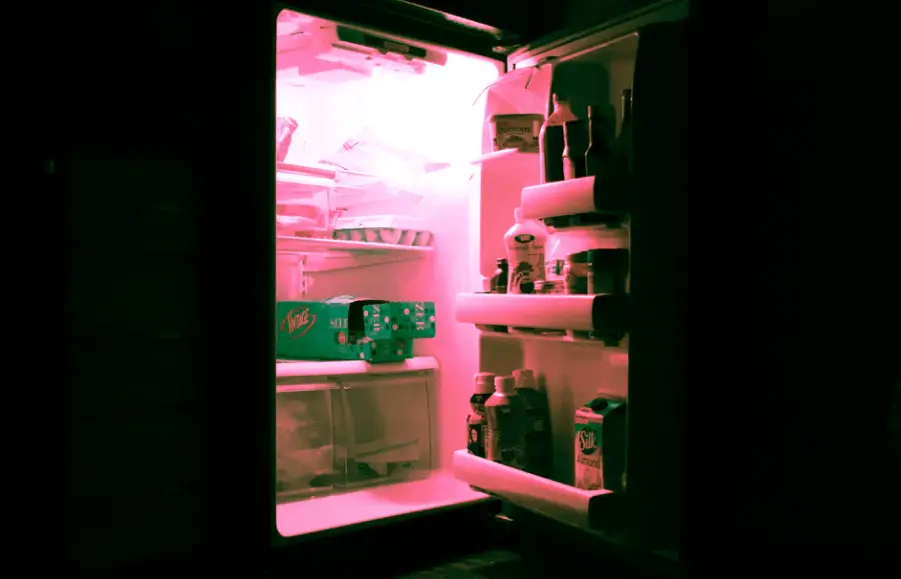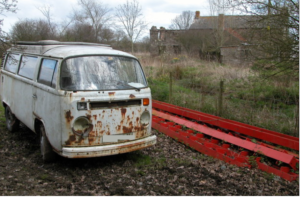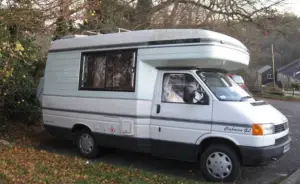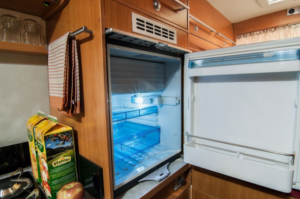Refrigerator in RV do not work on the same principle as your home or residential refrigerator. They do not use compressor for the operation.
They run on absorption based principle which means they do not use any moving parts to cool. Since the RV will be on the move continuously the refrigerator need to be good enough to handle the movement or shaking issues.
An RV refrigerator can run on propane, electricity and also DC battery. Most modern refrigerators in RV are run on a combination of propane and electricity though.
With multiple power sources operation, its a great advantage to have. You can run it on propane when you don’t have the shore power connection and then when you have the electricity connection, shut off the propane and go on 110 V.
Different Power Sources
When choosing RV refrigerators, your center of focus should be the power source it will be using. These refrigerators run using different power sources, and both have their pros and cons.
Furthermore, the time you spend during your vacation can help you to decide the type of power source you require.
The choice of power source may also be affected by the cost; that is, if you are not planning to use a lot of money on your vacation.
12 Volt DC Battery
Initially, RV refrigerators were driven by a battery which could not provide enough power for the entire camping session. However, it doesn’t mean that they don’t exist, of course, they are available with improved features for improved performance. Furthermore, you can operate them using inverters to increase the performance of your 12 Volt DC.
With battery you will be able to run it for around 4-5 hours only. Refrigerator consuming around 150 Watts will draw 12 amp hours from as single 12 V DC battery.
Read : How long will the rv refrigerator run on DC battery
LP Propane Gas
Apart from the battery, the RV refrigerator can also run on LP propane, which is considered very useful. The only challenge with this fuel source is the ability to fail working when placed on a surface that isn’t flat (more than 5 degrees).
However, LP propane also provides enough energy usable for extended camping days. Furthermore, if accidents occur and the gas starts leaking, the recreational vehicle and anything can get burned.
110 Volt Electricity
Finally, recreational vehicle refrigerators can also run on 110 Volt Electric power source. This option can be advantageous if you will be camping on the ground with a power source so, you will only need to plug in the cord into the power source.
This power option can be a good option if you are going to camp on dry land where you have access to electricity else; you may not use RV with such capabilities. However, you’ll realize that it’s not a useful power source whenever you travel.
What are 2 Way and 3 Way RV Refrigerators
When you are shopping for the best RV refrigerator on the market, you’ll need to consider the available types. Under the category, you should expect 2-way, 3-way, or DC/AC power refrigerators.
Choosing the correct power source ensures you get all the power needed to keep your foodstuffs form damage. However, all these types of refrigerators exploit what we call as absorption in such a way that heat from the fridge is drown using the refrigerant.
However, when the refrigerant turns into a liquid, it goes back to the refrigerator and absorbs the available heat again.
RV refrigerators using a 2-way power have a system designed to work with the electricity or LP gas. These type of refrigerators creates heat by using a 120V electric heating element or by burning Propane.
On the other hand, a 3-way power RV refrigerator can use a 120V, propane and also DC battery.
What type of refrigerator will be best
Honestly it depends on you and there is no one answer to this. As we saw there are mainly 3 power sources available and based on this get an answer to below questions, that will help you decide. Narcold, Dometic make some of the best RV refrigerators.
1. How much you want to pack inside the refrigerator
Knowing this will help you decide on two things. First the size of the refrigerator and second the power source. If you want a big sized refrigerator then you would also need more power to run it. With this if you aren’t connected to shore power then you would be finishing off the propane way too faster. Your DC battery will drain faster.
If you boondock or go dry camping too often then get a refrigerator that is more efficient on propane or battery or get a generator to run it of 110V. If you will be camping at campground with electricity connection then you will be fine.
2. Do you boondock often
As we already saw, boondocking will mean you will want to have better propane capacity and better battery back up. May be you can go solar and charge the batteries to stay with required power. Or get a generator good enough o support your power needs. Solar panels have been revelation over period of time. They help in keeping the batteries charged.
3. Do you have good batteries
If you choose to go DC battery operated refrigerator then be sure to have a good batteries power installed. Add on the solar panels to trickle charge them.
4. Propane accessibility
If you have issue with refilling the propane then you may want to look ate other sources. To be very honest propane is hard to give up. You would still need it for other appliances like furnace or heaters.
Can Residential Refrigerator Be Used In RV
Buying an RV refrigerator is often challenging bearing in mind the cost, size, and maintenance. Meanwhile, some recreational vehicle owners get tempted to use residential refrigerators rather than RV refrigerators without thinking of the pros and cons of both.
Firstly, RV refrigerators can withstand all the effects of travel, such as bumps, harsh weather conditions, vibrations durability. Using residential fridges on your recreational vehicle means that you’ll not enjoy the benefit of enhanced RV fridge features
Secondly, RV refrigerators can be powered 120V DC battery, 110V AC electric, or Propane. With all these options, it will be accessible to power your refrigerator anytime you want to use it, unlike the resident fridge, which works only with one power source.
However, if you don’t have a plan for buying RV refrigerator, then your residential refrigerators can serve you only that you’ll have to be ready to keep up with frequent maintenance that may cost you.
Can DC batteries power the RV refrigerators
As we have said above, you can use three main power options to power your RV refrigerator. If you are determined to know if DC batteries can be useful, then we shall explain all that in this section.
However, before we go further, you are right; DC batteries can power RV refrigerators only that it may function for about 8-10 hours. Therefore, using DC battery as the only source of power to your RV fridge may not be a good idea for long road trips.
However, the standard recreational vehicle comes with four 6V batteries, which provide about 200 amperes per hour. Such power can be used for 20 hours road trip when you have a fully charged battery.
If you plan to use other battery options, then we suggest incorporating an inverter, as it can increase the duration of your battery life.
There are other tips and tricks you can use to better the performance of your DC battery operated Recreation Vehicle refrigerator.
Battery rating: a fully charged battery has a 20-Voltage and 200Ah rating that will provide consistent 10Ah current for 20 hours. Now with proper planning, you can easily succeed using DC batteries on your RV refrigerator.
Power Consumption
On average a rv refrigerator consumes around 150-200 watts. Check complete considerations on camper refrigerator power consumption. The standard formula for calculating power consumption is Amps = Wattage/Volts.
Therefore, you can use this method to know the Amperes drawn by your RV fridge. Generally, the starting power is often more than the running ability. Thus, it is an excellent reason to plan effectively for the energy required during the camping session.
Read : Do i need to keep rv refrigerator running all time
Now let’s assume that you are interested in the power consumption pattern of your RV fridge. Then, you can use the formula Watt = Amperes × Volts to find the accurate figure. Now that we have a rough idea of your refrigerator’s rating, you’ll expect to use 400 to 600 Watts to start it.
However, running it will consume 150 to 200W. Therefore, you can easily plan for your journey and know the exact power you expect. With these figures, you can decide on the bill or Propane you need before you begin your journey.
How much propane RV Refrigerator use
The main reason why manufacturer have moved away from 12 V DC power for refrigerator is because of the depletion of the charge from the battery. The refrigerator ca easily drain the battery 50% in less than 4 hours or so.
If you compare it with propane, you would be consuming less than 1.5 pounds of propane over an entire day. That is much better specially when you are boondocking. With this calculation your entire propane tank of around 20 pounds can also an entire month of camping. And you would also be using it for other operations like water heater or cooking.
With advances in the way the refrigerator are made, propane consumption has also reduced. They are thermally more efficient and are also more safe with reduced emissions.
A lot also depends on how bug your refrigerator is, your way of usage. Obviously bigger refrigerator will consume more propane. Frequent opening f the refrigerator or packing it the wrong way will also reduce the efficiency.
Refrigerator Use While Driving
There are questions about what powers an RV refrigerator needs or whether it can be kept on or not when driving.
I understand that you have the wish to keep your fridge working all the time to keep your food in good condition.
However, most RV fridge manufactures aren’t for that idea. There are various reasons as to why you should not keep it running when you are driving.
Using Propane: Propane is the most convenient power source, has its pros and cons. First, Propane is flammable, which makes it dangerous to use when driving. In the case of accidents that result in propane leaks, the recreational vehicle may explode, causing loss of life and property.
Secondly, if the LP gas rests on a surface at an angle greater than 5 degrees, you’ll not get the power to run your fridge. Furthermore, when driving, you may encounter inclined surfaces that will tilt LP gas’s angle, leading to the failed operation.
Electricity: getting electric to run your RV fridge while driving can be challenging. First, you’ll need to have shore power to run an RV refrigerator run by electricity effectively.
Lastly, it will be close to impossible to run an RV fridge when using a battery as a source of power because it will last only for 3-8 hours. However, the modern RV refrigerators have been designed with features that ensure cold temperatures for up to 10 hours. Check this tips to keep the RV refrigerator cold while traveling.
Increase Refrigerator efficiency
Some way to increase the propane refrigerator efficiency :
1.Make sure the refrigerator is leveled.
When you set up the RV at a campground or boondocking site make sure it is perfectly leveled. This is not only makes you uncomfortable inside but also affects RV appliances including refrigerator.
The refrigerator operation is affected which results in reducing its efficiency. Make sure you make use of leveling blocks or hydraulic leveling. Some RVs come with Stabilizer jacks for this purpose. Once you are at the setup location make sure the ground i flat and then start the leveling process.
2. Set correct temperatures
Setting up correct knob setting is important with refrigerators. If its colder outside make sure you adjust the know to lesser cold setting. Simply setting it to very cold setting will mean unnecessary consumption.
3. Do proper maintenance
Doing regular maintenance on the refrigerator will not only make it more efficient but will also increase its life.
Monthly cleaning and minor maintenance will prevent any major faults. Its more a preventive check than repairs. Most refrigerator including home refrigerators do not generally need major maintenance.
But, since RV is continuously on the move there are higher chances of something getting wrong. So, at least have a visual check once in a while.
4. Make use internal fan
We have tried this and it works great. It can improve the overall efficiency of the refrigerator. Placing a small battery operated fan inside can help improve thermal exchange. Specially when the refrigerator is packed heavily this can bring in the relief and help circulate some air.
In Conclusion
RV Refrigerator working is different in comparison to your home or residential ones. Multiple power sources in them is a great advantages. Be sure to choose the one that best suits your lifestyle. Also, maintain it properly and make sure your RV is leveled while camping. Happy camping!





